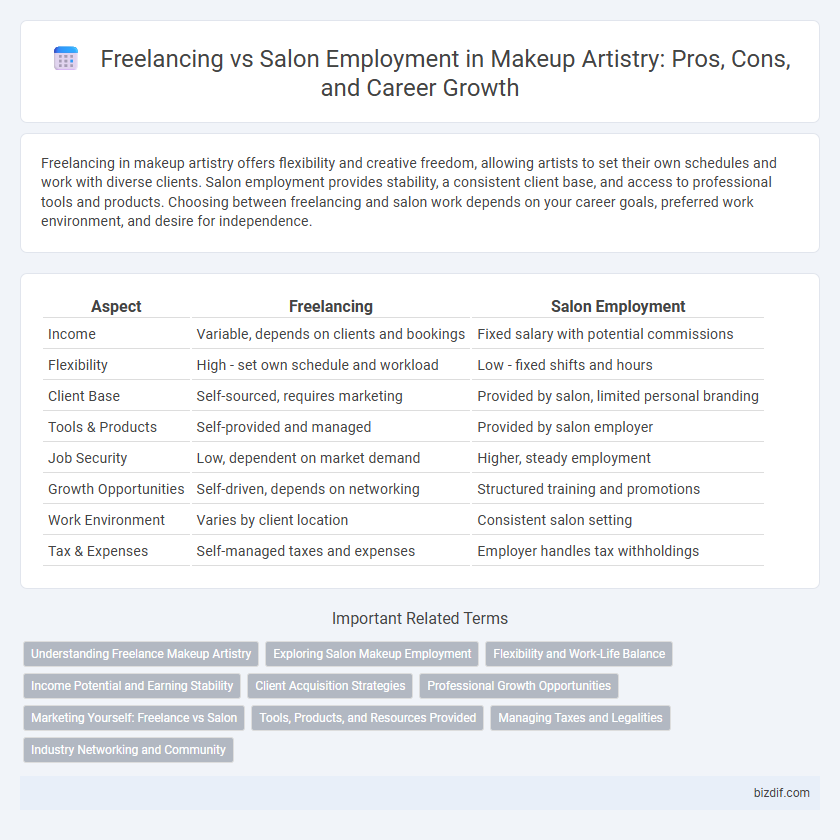Freelancing in makeup artistry offers flexibility and creative freedom, allowing artists to set their own schedules and work with diverse clients. Salon employment provides stability, a consistent client base, and access to professional tools and products. Choosing between freelancing and salon work depends on your career goals, preferred work environment, and desire for independence.
Table of Comparison
| Aspect | Freelancing | Salon Employment |
|---|---|---|
| Income | Variable, depends on clients and bookings | Fixed salary with potential commissions |
| Flexibility | High - set own schedule and workload | Low - fixed shifts and hours |
| Client Base | Self-sourced, requires marketing | Provided by salon, limited personal branding |
| Tools & Products | Self-provided and managed | Provided by salon employer |
| Job Security | Low, dependent on market demand | Higher, steady employment |
| Growth Opportunities | Self-driven, depends on networking | Structured training and promotions |
| Work Environment | Varies by client location | Consistent salon setting |
| Tax & Expenses | Self-managed taxes and expenses | Employer handles tax withholdings |
Understanding Freelance Makeup Artistry
Freelance makeup artistry offers unparalleled creative freedom and the opportunity to build a personalized client portfolio, adapting techniques to diverse demands across weddings, fashion shoots, and special events. Success in freelancing depends on strong self-marketing skills, a robust online presence, and the ability to manage bookings, finances, and client relationships independently. Unlike salon employment, freelancers control their schedules and pricing but must invest in continuous education and professional-grade tools to maintain competitive expertise in the beauty industry.
Exploring Salon Makeup Employment
Salon makeup employment offers consistent client flow and the opportunity to build a professional portfolio through diverse makeup applications. Working in a salon environment provides access to advanced beauty products and tools, enhancing skill development and industry knowledge. Regular collaboration with hairstylists and aestheticians fosters a creative and supportive workspace, accelerating career growth in makeup artistry.
Flexibility and Work-Life Balance
Freelancing in makeup artistry offers unparalleled flexibility, allowing artists to choose their clients, set their schedules, and work from various locations, enhancing work-life balance. Salon employment provides structured hours and a consistent client flow, which benefits those seeking stability but may limit personal time and flexibility. Prioritizing flexibility and work-life balance, freelancing suits artists valuing autonomy, while salon roles appeal to those preferring routine and security.
Income Potential and Earning Stability
Freelance makeup artists often experience higher income potential due to the ability to set personalized rates and book diverse clients, but income can be unpredictable and fluctuate with demand. Salon-employed makeup artists receive a consistent salary or hourly wage, offering reliability and steady earnings, though income growth may be limited by fixed pay scales and fewer client opportunities. Balancing the flexibility and entrepreneurial control of freelancing with the financial security of salon employment is essential for career planning in makeup artistry.
Client Acquisition Strategies
Freelance makeup artists leverage social media platforms, personalized portfolios, and word-of-mouth referrals to attract a diverse client base, emphasizing direct communication and tailored service offers. Salon-employed artists benefit from an established clientele and in-house marketing efforts, often gaining walk-in clients through the salon's reputation and promotions. Both approaches require optimizing online presence and networking to maximize client acquisition effectively.
Professional Growth Opportunities
Freelancing in makeup artistry offers diverse professional growth opportunities through exposure to varied clients, projects, and creative challenges, fostering adaptability and a unique portfolio. Salon employment provides structured learning environments with mentorship from experienced artists, consistent client flow, and access to advanced tools and techniques, which enhance specialization and skill refinement. Both paths contribute to career advancement, but freelancers often expand business acumen and personal branding, while salon artists benefit from stability and collaborative expertise.
Marketing Yourself: Freelance vs Salon
Freelance makeup artists must actively market themselves through social media, personal websites, and client testimonials to build a distinct brand and client base. Salon-employed artists benefit from the salon's established clientele and marketing resources, allowing them to focus more on skill development than self-promotion. Building a strong online presence and networking are crucial for freelancers to compete with the visibility provided by salon affiliations.
Tools, Products, and Resources Provided
Freelance makeup artists invest in their own extensive collection of high-quality brushes, palettes, and skincare products to maintain versatility and hygiene. Salon-employed artists benefit from access to professionally stocked tools and branded product lines, often receiving regular replenishments without personal expense. While freelancing demands upfront costs and self-managed inventory, salon positions offer resource stability, enabling focus purely on technique and client service.
Managing Taxes and Legalities
Freelance makeup artists face complex tax responsibilities, including self-employment taxes, quarterly estimated payments, and maintaining detailed expense records for deductions like supplies and studio rental. Salon-employed artists benefit from simplified tax filing as employers handle payroll taxes, but they have less control over write-offs and deductible expenses. Understanding legal structures such as obtaining necessary licenses and insurance is crucial for freelancers to ensure compliance and protect their business.
Industry Networking and Community
Freelance makeup artists build diverse industry networks by collaborating with various clients, photographers, and event planners, enhancing their exposure and versatility. Salon employment offers a built-in community of professionals, promoting steady client referrals and consistent skill-sharing opportunities. Both paths provide unique networking advantages that influence career growth and industry presence.
Freelancing vs Salon employment Infographic

 bizdif.com
bizdif.com